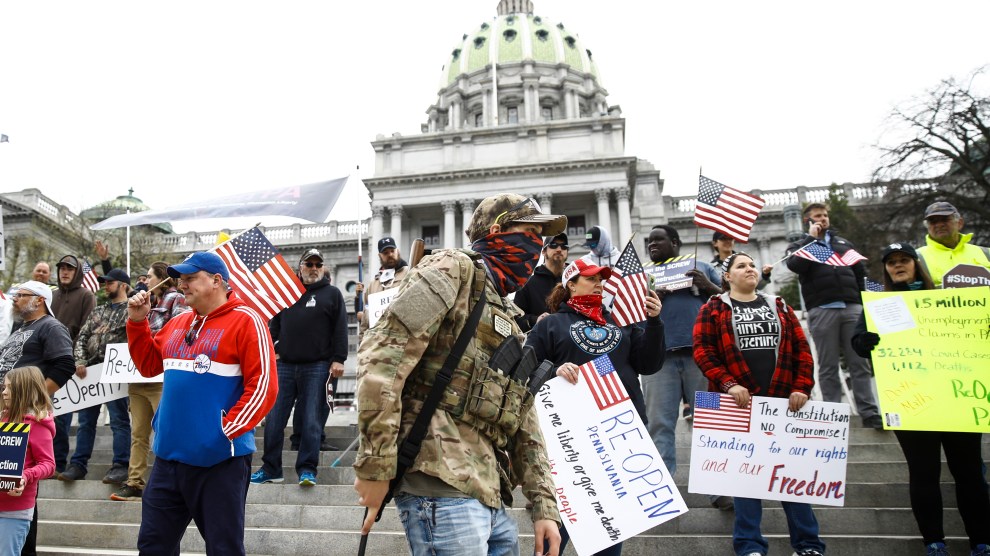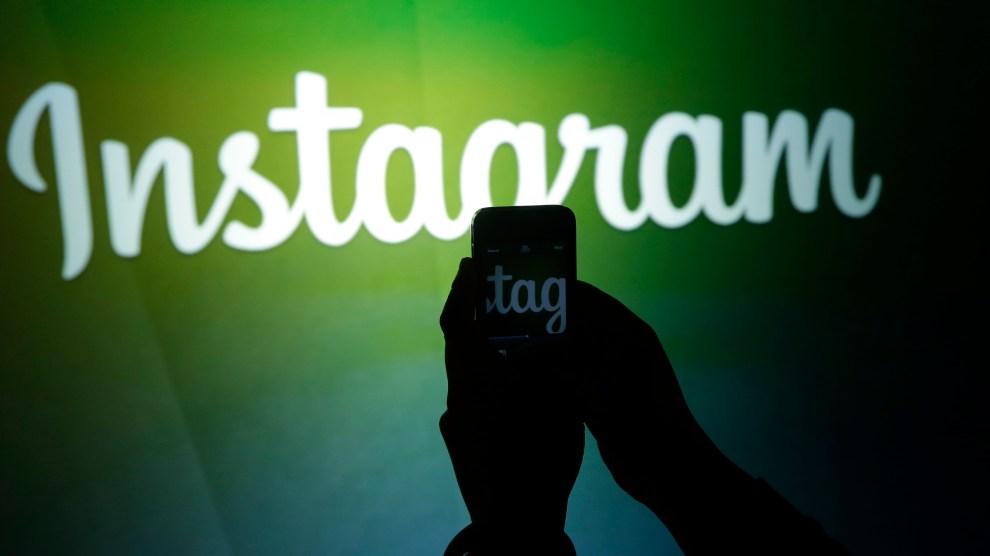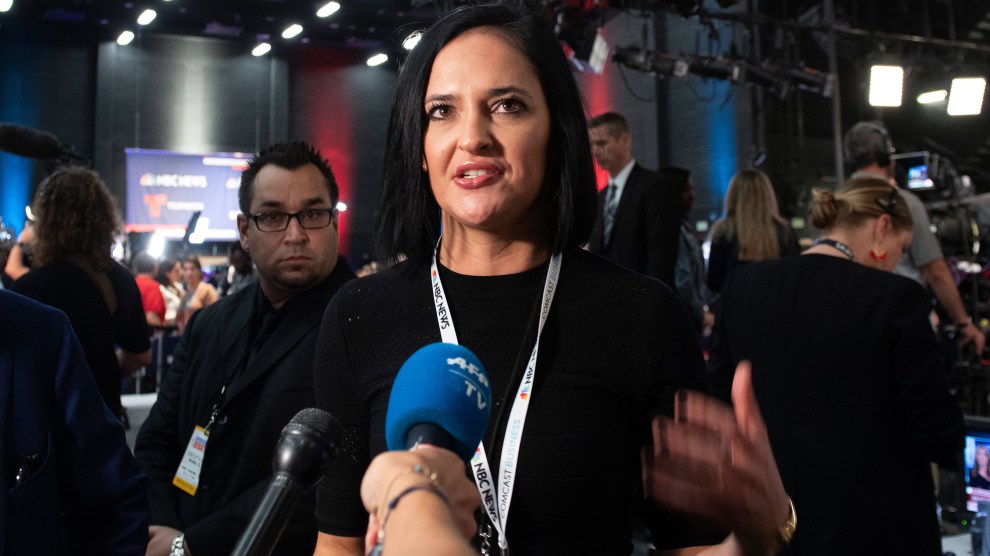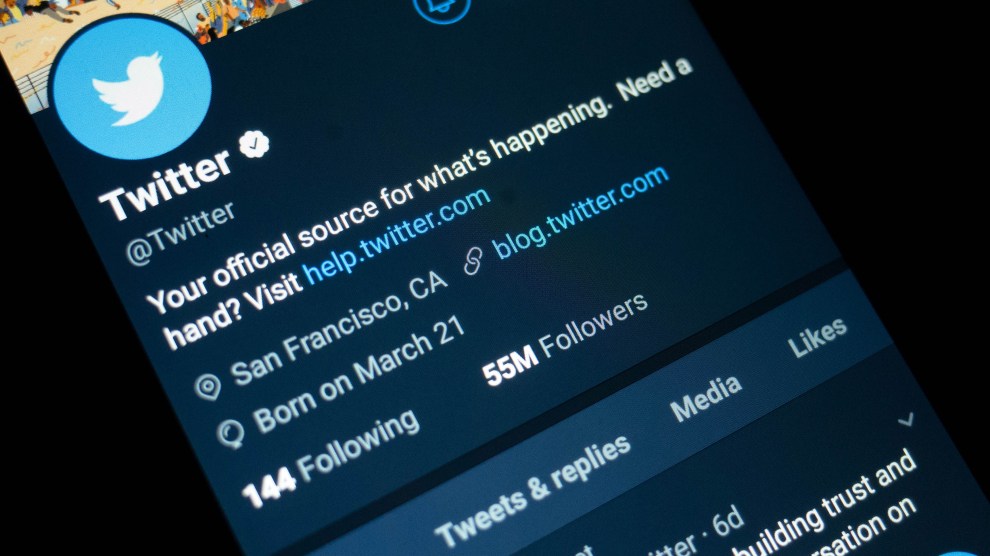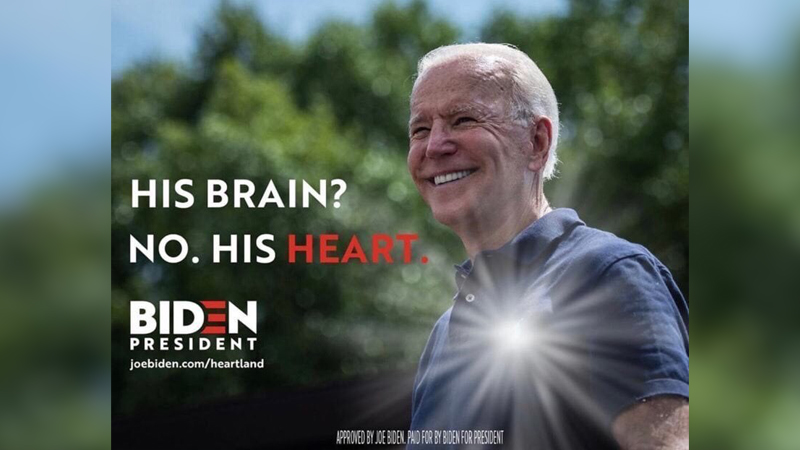
Screenshot from Brad Troemel's Instagram
According to Brad Troemel, anyone who didn’t get that the fake Biden ad he made was a work of satire was just missing the joke.
Last Wednesday, Troemel, a Brooklyn-based artist, made and posted the latest entry in what he describes as a regular “art practice of crafting weapons-grade liberal cringe” memes. This one was a fake, but plausibly high-grade, ad bearing a glowing image of Joe Biden with superimposed text reading “His Brain? No. His Heart.”
Troemel’s posts usually earn hundreds or even thousands of likes, but this one went much further. Both Biden and Trump supporters shared the meme, making a small Twitter account’s post of it alongside the words “100% real” go viral. Former Trump campaign adviser Karen Giorno tweeted it, writing, “No joke. This is a real ad approved by @JoeBiden for President. Just to be clear…the Biden Campaign wants us to know that they know that we know he has dementia but we should elect him anyway because he has…wait for it…HEART?!?!”
Over the weekend, Twitter took enforcement action on the image, appearing to block users from posting or reposting the image. A Twitter spokesperson said the company had ruled that the meme violated its Elections Integrity Policy, which bans content that misrepresents having an affiliation with a campaign. While the policy has exceptions for parody, they specifically carve out parody accounts, not parody content. The spokesperson declined to answer more detailed questions about how the image violated its policy.
In a statement to the Verge, Bill Russo, deputy communications director for the Biden campaign, didn’t mention the meme’s comedic origins, but focused on its popularity on the right: “While the President continues to assail our free press as ‘fake news’—once again it is his campaign spreading lies and disinformation. Sadly, we don’t expect any better.”
Troemel—who aligns left politically, is critical of capitalism and has a history of both political donations and posts in support of Bernie Sanders—laughed at the Biden campaign’s criticism of the ad in a video he posted to Instagram on Sunday responding to the chain of events. “It’s not every day you make some art that prompts a public response from both Joe Biden and Donald Trump,” he boasted, before launching into an explanation of the political beliefs and history that animated his making of the meme.
Troemel argued that it was incorrect to ban the ad on the grounds that it’s misleading: “The ad is real. Not in the sense that it was released by the Biden campaign. But it’s real in the sense that it’s true.” In the video, Troemel went on to highlight what he described as Biden’s decayed mental and moral faculties, citing the former vice president’s voting record on things like the authorization of the Iraq War, Patriot Act, and the 1994 crime bill, along with his attacks on Anita Hill and his long and ever-increasing catalog of on-camera gaffes and misstatements.
“The DNC and the Biden campaign are the ones responsible for your familiarity with this type of messaging, because they’re the ones who have been fucking campaigning on it,” Troemel continued. “This image wouldn’t be shared if it wasn’t so believable.”
The post’s believable pitch comes as a key part of Troemel’s efforts to make work parodying center-left politics by “accelerating [liberal beliefs] ever so much, so that you reveal their inner workings by saying the quiet part loud.” Previous examples have satirized politicians including Amy Klobuchar, Hillary Clinton, and other establishment Democrats.
Satire and parody works from artists like Troemel have long caused headaches for tech platforms, as they try to sort out the sometimes extremely blurred line between art and misinformation. Fact-checkers for tech platforms have partially censored apolitical artwork showing digitally augmented landscapes, blocking the spread of Instagram posts depicting rainbow-tinted mountains. Irony presents an even greater challenge. Comedian Brandon Wardell was temporarily suspended from Twitter last month over a joke in which he changed his account information to appear as though he was Biden and then tweeted “ughhhh im dead.”
Twitter’s move to censor Troemel’s meme is inconsistent with previous decisions to leave up videos that appear to have been created as deliberate misinformation by the right-wing. In November 2018, the company opted to take no action on a video of Jim Acosta blocking a White House intern from grabbing a microphone he was using during a press conference that had been doctored to make it appear as though he had pushed her. In May 2019, it also left up a video altered to make Nancy Pelosi appear drunk.
Troemel’s Biden meme apparently blurs the line between parody and misinformation so much that the more gullible and the less steeped in internet irony have a hard time seeing the joke, to the point where some critics wonder if he’s gone too far. Jennifer Grygiel, a communications professor at Syracuse University who specializes in social media and memes, thinks he has.
“He seems to want to cross his arms and say that everyone is so stupid,” Grygiel said on the phone, skeptically. “He may claim that he’s helping democracy, but he’s lost control of his art.”
Adrian Chen similarly noted in a 2017 New Yorker profile that while Troemel’s work “can embody the freewheeling creativity that is the best part of Internet culture, it often falls into the trap of the troll who mistakes a lack of accountability for freedom, provoking with obnoxious antics simply for the sake of generating a reaction, then laughing in your face when you fall for the joke.”
In Troemel’s view, whether or not people get the joke, and whether it helps or hurts Trump by hurting Biden, is not his problem. Nor does he believe that doing any of that is the job of his art.
To people who complain, he has a ready response: “I’ve got some bad news for you. You might not like art as much as you think you do. The purpose of art isn’t to cheerlead credit card company lackeys. It’s to respond to the time in which you exist.”

